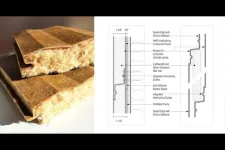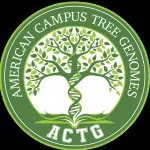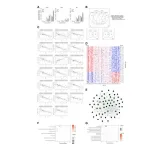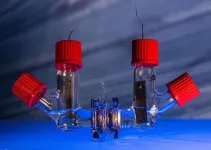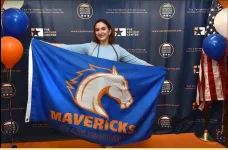BU researchers first to identify a signaling molecule in neuroblastoma immunosuppression and aggressiveness
Disrupting CKLF represents a promising immunotherapeutic approach to battle certain tumors
2024-03-15
(Press-News.org) (Boston)—The MYCN oncoprotein (proteins related to the growth of cancer cells) plays a key role in starting, advancing and making it difficult to treat various human cancers. When MYCN is overactive, especially in high-risk neuroblastoma (childhood cancer often found in the adrenal glands), the tumors become less responsive to immunotherapy—a treatment that uses the body's immune system to fight cancer. Still, recognition of this problem has not led to any effective strategies to tackle this problem.
In a new study from Boston University Chobanian & Avedisian School of Medicine, researchers found that MYCN selectively increases the levels of a signaling molecule, CKLF, in neuroblastoma cells to suppress anti-tumor immune responses and promote tumor aggressiveness.
“As scientists, we are looking for ways to make these less responsive tumors more receptive to immunotherapy to increase its effectiveness. Understanding how tumor cells utilize this molecule to communicate with immune cells will facilitate the development of effective immunotherapeutic strategies to provide more effective treatments with fewer toxicities for children with high-risk neuroblastoma,” explained corresponding author Hui Feng, MD, PhD, associate professor of pharmacology, physiology & biophysics at the school.
The researchers studied an experimental model, clinical patient samples, and in-vitro cell culture. The experimental models of neuroblastoma with and without overexpression of the signaling molecule, CKLF, were compared for their ability to increase tumor aggression through the suppression of anti-tumor immune responses.
According to Xiaodan Qin, PhD, the first author of the study and a research scientist in the Feng Lab, the research is critical to understanding the mechanisms by which tumor cells induce a tumor microenvironment that compromises the function of immune cells, and it uncovered additional therapeutic approaches to evoke anti-tumor immune responses. “The long-term goal of this research is to uncover effective drugs that are much less toxic than chemotherapy and radiotherapy for treating high-risk neuroblastoma and perhaps other types of MYCN-driven childhood cancers,” Feng says.
The findings appear online in Science Advances.
Funding for this study was provided by grants from the National Institutes of Health (NIH: CA134743 and CA215059), the St. Baldrick’s Foundation, the National Science Foundation (1911253), the American Cancer Society (RSG-17-204-01-TBG), and the Alex’s Lemonade Stand Foundation to H.F; X.Q. is supported by a Warren Alpert Distinguished Scholars Fellowship; X.Z. is supported by a postdoctoral fellowship from the China Scholarship Council (No. 201808440648). S.S. is supported by a Young Investigator Award from the Rally Foundation for Childhood Cancer Research and the Friends for Life Neuroblastoma Fellowship. J.B.I. acknowledges support from the NIH (K12CA090354) and Conquer Cancer Foundation. A.F. and K.S. are supported by the Undergraduate Research Opportunity Program from Boston University. H.N. received the support through a POST award from the Alex’s Lemonade Stand Foundation. D.B.K. is supported by a grant from the NIH (R01HL157174). R.E.G. acknowledges support from the St Baldrick’s Foundation, a DoD Idea Award (CA191000), and an NIH grant (R01CA271605). The Dana-Farber/Harvard Cancer Center is
supported in part by an NCI Cancer Center Support 39 Grant (NIH P30CA06516).
Note to editors:
D.B.K. is a scientific advisor for Immunitrack, a wholly owned subsidiary of Eli Lilly and Company and Breakbio. D.B.K. owns equity in Affimed N.V., Agenus Bio., Armata Pharmaceuticals, Breakbio, BioMarin Pharmaceutical, Celldex Therapeutics, Editas Medicine, Gilead Sciences, Immunitybio, Lexicon Pharmaceuticals. BeiGene, a Chinese biotech company, supported unrelated SARS COV-2 research at TIGL. C.J.W. holds equity in BioNTech and receives research funding from Pharmacyclics, and is on the advisory boards of Repertoire and Aethon. X.Q. and H.F. filed a provisional patent sponsored by the Trustees of Boston University.
END
ELSE PRESS RELEASES FROM THIS DATE:
2024-03-15
Philadelphia, March 15, 2024 – Researchers from Children’s Hospital of Philadelphia (CHOP) identified a key metabolite in cells that helps direct immune responses and explains at a single cell level why immune cells that most efficiently recognize pathogens, vaccines, or diseased cells grow and divide faster than other cells. The findings also indicate that a better understanding of this metabolite and its role in immune response could improve the design of immunotherapies and create longer-lived responses against different types of cancer as well as enhance vaccine strategies. The findings were published ...
2024-03-15
Weill Cornell Medicine investigators discovered that unique bacteria colonize the gut shortly after birth and make the neurotransmitter serotonin to educate gut immune cells. This prevents allergic reactions to food and the bacteria themselves during early development.
The preclinical study, published in Science Immunology on Mar. 15, showed that bacteria abundant in the guts of newborns produce serotonin, which promotes the development of immune cells called T-regulatory cells or Tregs. These cells suppress inappropriate immune ...
2024-03-15
People who identify as lesbian, gay and bisexual – particularly women – respond more positively to tobacco marketing, are more inclined to smoke cigarettes daily and may have a more difficult time quitting, according to two studies by a Rutgers Health researcher.
The studies, published in the Annals of LGBTQ Public and Population Health and Preventive Medicine Reports, investigated how some among the LGBTQ population respond to tobacco marketing, how they use tobacco and their history of quitting using two large national datasets, including the Population Assessment of Tobacco and ...
2024-03-15
Researchers from Rensselaer Polytechnic Institute (RPI) will use hemp to develop a commercially viable, durable, and low-embodied-carbon insulated siding product to address what the U.S. Green Building Council says is a “crucial need for building retrofits to improve energy efficiency and reduce carbon emissions.”
The three-year, $1.5 million award given as part of the Buildings Energy Efficiency Frontiers and Innovation Technologies (BENEFIT) funding opportunity from the United States Department of Energy (DOE) will support RPI faculty and industry partners in creating Hemp Retrofit Structural Insulated Panel (HeRS), a hemp-based insulated siding system that ...
2024-03-15
Pears are big business in the Pacific Northwest US. But did you know that traditional pear breeding has remained largely unchanged for centuries? This slow process is difficult and costly, requiring the long-term commitment of labor, materials, and land-space resources. However, traditional pear breeding might get some help from genomics, thanks to a unique collaboration between students, scientists, and the pear industry fostered through an initiative called the American Campus Tree Genomes (ACTG).
ACTG was born from two professors’ ...
2024-03-15
BIRMINGHAM, Ala. – Hunger can drive a motivational state that leads an animal to a successful pursuit of a goal — foraging for and finding food.
In a highly novel study published in Current Biology, researchers at the University of Alabama at Birmingham and the National Institute of Mental Health, or NIMH, describe how two major neuronal subpopulations in a part of the brain’s thalamus called the paraventricular nucleus participate in the dynamic regulation of goal pursuits. This research provides insight into the mechanisms by which the brain tracks motivational ...
2024-03-15
“Our approach identified genes that were previously implicated in aging, as well as new ones that may warrant further investigation.”
BUFFALO, NY- March 15, 2024 – A new research paper was published on the cover of Aging (listed by MEDLINE/PubMed as "Aging (Albany NY)" and "Aging-US" by Web of Science) Volume 16, Issue 5, entitled, “Genome-wide transcriptome profiling and development of age prediction models in the human brain.”
Aging-related transcriptome changes in various regions of the healthy human brain have been explored in previous works, however, a study to develop prediction models for age based on the expression levels of specific ...
2024-03-15
People with voice disorders, including those with pathological vocal cord conditions or who are recovering from laryngeal cancer surgeries, can often find it difficult or impossible to speak. That may soon change.
A team of UCLA engineers has invented a soft, thin, stretchy device measuring just over 1 square inch that can be attached to the skin outside the throat to help people with dysfunctional vocal cords regain their voice function. Their advance is detailed this week in the journal Nature Communications.
The new bioelectric system, developed ...
2024-03-15
by Jade Boyd
Special to Rice News
HOUSTON – (March 15, 2024) – Rice University synthetic biologists have found a way to piggyback on the glucose monitoring technology used in automated insulin dosing systems and make it universally applicable for the monitoring and dosing of virtually any drug.
In a recently published study in Nature Communications, researchers in the lab of Caroline Ajo-Franklin demonstrated the technique by modifying a blood-glucose sensor to detect the anticancer drug afimoxifene ...
2024-03-15
Seven undergraduate students from The University of Texas at Arlington headed to Washington, D.C., for a hands-on program to live, learn and intern in the nation’s capital.
Founded in 2001, The Archer Center is the Washington, D.C., campus of the University of Texas System. Students accepted to its Archer Fellowship Program move to the Capitol Hill area of Washington to live with other Archer Fellows and take courses taught by UT faculty and policy experts. The scholars also participate in a ...
LAST 30 PRESS RELEASES:
[Press-News.org] BU researchers first to identify a signaling molecule in neuroblastoma immunosuppression and aggressiveness
Disrupting CKLF represents a promising immunotherapeutic approach to battle certain tumors
